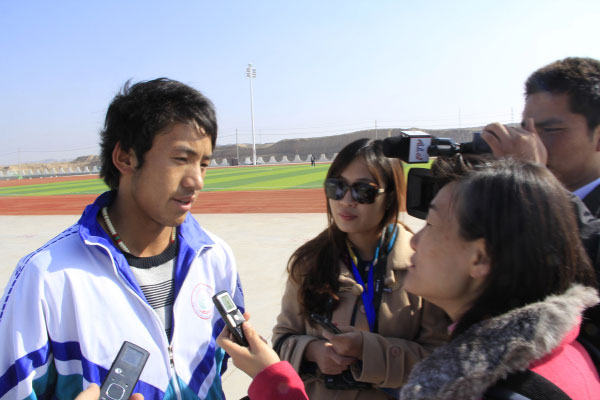New school bell rings for Tibetan students
Updated: 2012-10-23 13:28
By Yang Jie (chinadaily.com.cn)
|
||||||||
Hundreds of Tibetan teenagers who suffered the devastation of a deadly mudslide have moved into a new school two years after the tragedy.
Most were affected by the rain-triggered mudslide, which hit Zhouqu county in Gannan Tibetan autonomous prefecture in Gansu province in August 2010, leaving at least 1,435 people dead.
Lanzhou New Area Zhouqu Middle School, located in Lanzhou, Gansu province, has now become a safe haven for 1,700 senior high school students since it took in its first batch of students this September.
"The new school is bigger, and the teachers are better because they use more advanced (instruments)," said Li Caozhi, a Tibetan freshman from Zhouqu, carrying a big string bag of basketballs ahead of a physical education class in the school's gymnasium.
Li lives on campus in one of the school's four dormitory buildings for students. His parents are still back at home, and he has a brother and a sister who both dropped out of school.
"In my class, there are more than 50 students, among whom more than 20 are from Zhouqu. My new classmates are also easy to get along with," said Li.
With more than 165 million yuan of investment earmarked from the central government, Lanzhou New Area Zhouqu Middle School has everything a well-equipped modern middle school should have, which is not something taken for granted in the underdeveloped western region.
With all kinds of teaching and experiment buildings, a Tibetan dining hall and a library, the newly completed school is designed to house 60 classes for 3,000 students and a faculty of 500.
What's more, the sports stadium has a football pitch with man-made grass and eight laps of 400-meter track that would put even many Chinese universities to shame.
"I want to attend university after graduating from high school," the shy boy expressed his strong wish for more education with no hesitation. Although he doesn't have a dream university, he said he loves Tibetan music and wants to major in a good subject.
Nonetheless, the new school doesn't stop Li from getting homesick and he already started missing his parents though it has been only one month since he left home. He plans to go home during summer and winter breaks.
Psychological help
In case students suffer post-traumatic stress symptom due to the tragic disaster they witnessed, Lanzhou New Area Zhouqu Middle School has a strong mental counseling team.
Aside from one mental health counselor, the head of the school has a masters degree in psychology and three of the school's directors are professional mental counselors certified by national authorities, according to a vice-president of the school.
As a professional mental counselor himself, the vice-president explained psychological intervention shall be delivered with discreet help.
"The basic principle of psychological intervention is to help patients build up self-confidence and allows them to overcome difficulties on their own," said the vice-president, "Psychological intervention is not a mystery, but it's a serious issue. Improper intervention may cause lifelong harm to the patients. Unless the students come to us and want to have counseling, we shall not impose it on them."
Tibetan culture indispensable
Considering that a large number of the students are Tibetan, the school has recruited qualified teachers of Tibetan with the help of the education authority of Gannan Tibetan autonomous prefecture, according to the vice-president.
"Unlike students of Han nationality, Tibetan students have lessons in Tibetan language instead of English. They have seven lessons per week," he added, "teachers of Tibetan also teach Tibetan to the faculty because many of them don't speak Tibetan."
When teaching Tibetan students, teachers must first understand their customs and respect their differences, he emphasized. "After all, we don't want our students to all look the same."
Senior students must be relocated elsewhere to continue their study so that they can make room for junior students and younger and allow them to attend local schools, according to the reconstruction plan of Zhouqu due to the damage caused by the mudslide.
"I always tell the students that they are making great contributions to Zhouqu and that they are doing good things for their little sisters and brothers," said the school vice-president, "This is something they should be proud of."

 Relief reaches isolated village
Relief reaches isolated village
 Rainfall poses new threats to quake-hit region
Rainfall poses new threats to quake-hit region
 Funerals begin for Boston bombing victims
Funerals begin for Boston bombing victims
 Quake takeaway from China's Air Force
Quake takeaway from China's Air Force
 Obama celebrates young inventors at science fair
Obama celebrates young inventors at science fair
 Earth Day marked around the world
Earth Day marked around the world
 Volunteer team helping students find sense of normalcy
Volunteer team helping students find sense of normalcy
 Ethnic groups quick to join rescue efforts
Ethnic groups quick to join rescue efforts
Most Viewed
Editor's Picks

|

|

|

|

|

|
Today's Top News
Health new priority for quake zone
Xi meets US top military officer
Japan's boats driven out of Diaoyu
China mulls online shopping legislation
Bird flu death toll rises to 22
Putin appoints new ambassador to China
Japanese ships blocked from Diaoyu Islands
Inspired by Guan, more Chinese pick up golf
US Weekly

|

|







